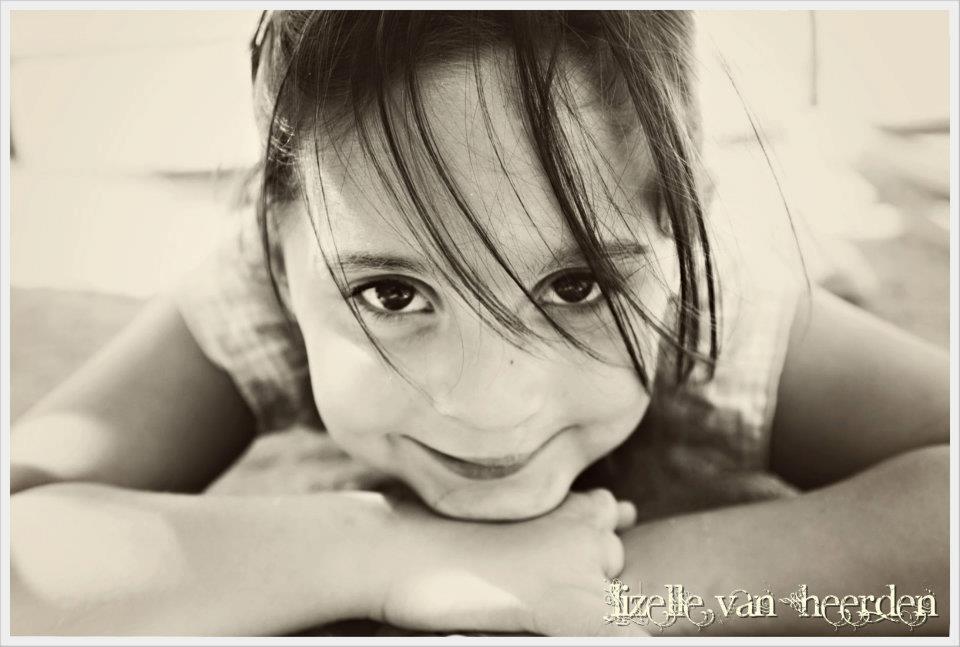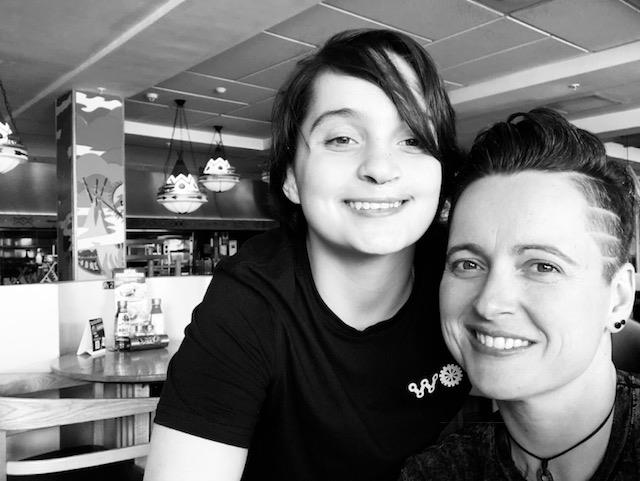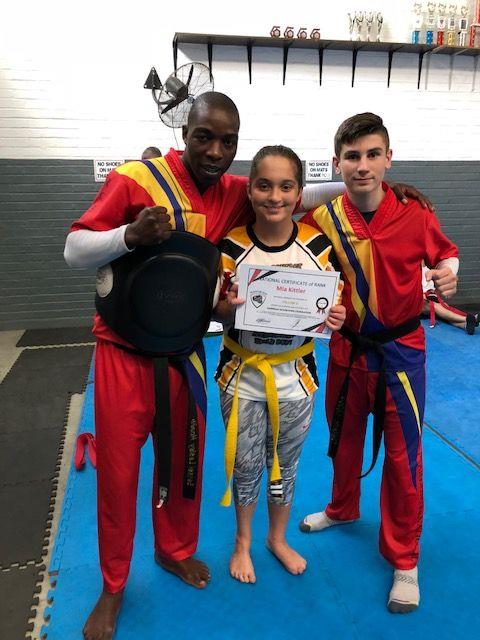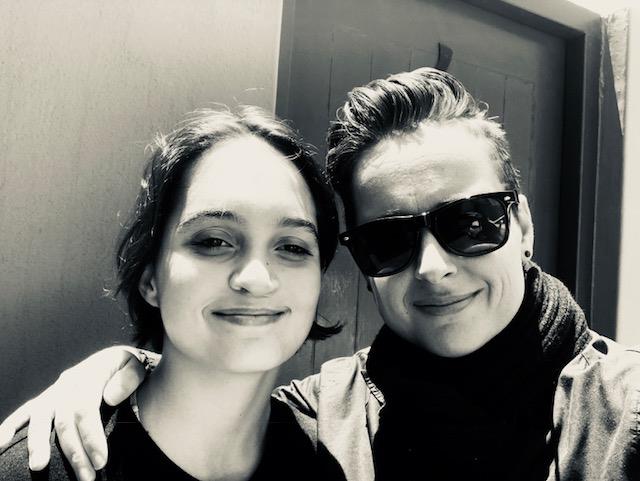Our differences shouldn’t matter
Knowing the signs of bullying, even from a young age, can make a big difference in your child's life.
Mariselle Stofberg
It is any parent’s biggest fear to realise their child has been the victim of bullying. Bullying does not choose an age, gender, sexuality or social or economic status.
The effects of bullying can be seen in children as young as five years old, and knowing how to react and step in as a parent can make a big difference to your life and that of your child.
The Kittler family has experienced the reality of bullying since their daughter Mia, now 15, was very young.
“Mia was born with disabilities and I started noticing that kids and even adults sometimes made rude remarks right from the beginning. The real challenges only came in once she started socialising and kids refused to play with her because of her short fingers. She would often cry and tell me kids are calling her names. For a long time, she would sit and play by herself,” said Mia’s mother, Yolandi Kittler.
The family, however, is made up of strong and independent women who raised Mia to believe that her disability does not define her.
“It obviously breaks you when other children don’t want to include your child in everyday activities, but you also need to understand that in a way she is different, and this might scare or confuse uneducated people. I taught Mia to be independent and strong from an early age and she is quite headstrong, but I believe without this confidence and determination, children would walk all over her,” Yolandi added.
Developing skills to handle bullying
As a parent, you might want to shield your child from difficult situations, but Yolandi decided instead to help Mia develop skills to handle these situations.
The 15-year-old has also been physically bullied, which added a new dynamic to an already problematic situation.
“It is important not to remove your child from difficult situations, but rather help them deal with the rejection and find ways to channel the negative energy. As she was physically bullied as well, I enrolled her in kickboxing classes and explained that physical violence is never the answer, but in her case, she had to punch this boy back for him to realise that she is not his punching bag and it was not okay for him to slap or kick her.”
After Mia stood up for herself, she and her bully eventually became friends.
“You as a parent will not always be there to protect them, be it physically or emotionally. I believe it is important for them to be able to protect themselves. Kickboxing is a great way to exercise and get rid of frustrations and anger in a controlled environment. Her kickboxing club is like family and will always support her,” Yolandi said.
Creating a safe space
The mother further said she believes that as a parent, you should create a safe space where your child feels comfortable to speak to you about things like bullying.
“Ask them about school every day, because this is important. As a parent, you really need to listen to your children. Often kids will complain about teachers or children bullying them and this is easy to just brush off as your child just being sensitive, but there is usually more to the story, especially if there is behavioural change.”
Yolandi encouraged parents to speak to the school councillor or headmaster and voice their concerns as many times as necessary.
“I have personally walked up to a boy on the playground and told him that it would be the last time he bullies Mia, but it is best to do this with the school’s support. As Mia was really struggling at one stage, I told her to make a video and tell the children how their bullying makes her feel – it was watched by thousands and she was really proud that she could stand up and say something. No form of bullying is too small to address – bullying is never okay!”
Standing up for yourself
Mia decided to be the change she wanted to see in the world and made a video, which she posted to Facebook, to help shed some light on the reality of bullying.
“One day I just woke up and realised that my differences shouldn’t matter. I have a lot of friends that come from different cultures and backgrounds and I figured that, since their differences don’t mean anything to me, mine shouldn’t mean anything to them. I had a talk with one of my friends (who was also being bullied) and realised it had to stop.
“I made the video to the kids being bullied so they could see that they weren’t alone and hopefully make them realise that they’re worth more than their imperfections. I chose Facebook since I knew a lot of parents would see it and they’d show it to their children, so I knew it would be spread around and my words would not fall on deaf ears,” Mia said.
The teen said she would get comments about her hands, weight and looks and would get picked on, get called lazy and made fun because of what she liked.
“I was really into a game called ‘Five Fights at Freddy’s’ when I was younger, and I’d get ridiculed and called childish because of it. I had water thrown on me, I was slapped, punched, kicked and even on one occasion spat at. I got cyber bullied as well with people saying horrid things to me anonymously,” she said.
Emotional vs physical bullying
“Honestly, I don’t think there’s a difference between emotional and physical bullying. Bullying is bullying. They are both scarring, whether it be by permanent marks left on you by others, or emotional trauma left by their words. They are both extremely damaging, and one is not ‘better’ or ‘less painful’ than the other,” Mia said.
She added that after being bullied, she often felt sad, angry and frustrated.
“I felt sadness because I felt worthless. These were my peers and their opinions meant everything to me. So, since they labelled me as ‘bad’, I believed them. After all, if someone says something enough times, it must be true, right? I felt angry because it was unfair and I knew it.
“I wished I could be like the skinny, blonde and popular kids that got all the love and affection from everyone. I found it unfair since I was born this way and I couldn’t help it. And frustrated because no matter how many times I reported it, how many times I ignored them or fought back, no matter what I said or did, it was never good enough. They didn’t stop. It all felt hopeless,” the teen said.
“But I had friends. And slowly they made me realise that they loved me, and their opinion was all that mattered. My parents were usually by my side and I knew that I didn’t need to listen to the insults.
“As people say ‘those who mind don’t matter, and those who matter don’t mind’. It took a while, but they made me realise I was more than the insults and I was good enough.”
Tell someone
Mia said she believes everyone’s situation is different when it comes to being bullying, and what worked for her might not work for someone else.
“Sometimes staying quiet and ignoring them works. Sometimes fighting back works. Sometimes telling someone about it works. It all depends on the situation. I recommend telling someone about it, though. Preferably a grown-up, as they can give you good advice and help. If someone insults you and you shrug it off, they’ll most likely stop. They’ll see their opinion means nothing to you and hopefully back off. So, tell someone and be confident,” she said.
Mia urged others to not try to always please everyone.
“You’ll never be skinny enough or pretty enough or smart enough for them. People are judgemental. That’s just how it is. So instead of doing things for them, do things for yourself.
It gets better
“Live life to the fullest! Make friends and live your dreams! See what life has to offer. Because trust me, it gets better,” she said.
“I’m not saying it’ll get better immediately. And I’m not saying things will always be good. But they get better,” Mia said.
“There’s so much good out there waiting for you. And please don’t ever end things. Suicide is never the answer. It’s a very permanent solution to a non-permanent problem. The bullying will end. Maybe not today. Maybe not in the next year. But it will end. Please reach out to people you trust. Whether it is friends, family or even online friends.
“I’m not going to say you should stay alive for them, because you deserve more than that. You should stay alive for you. And please know that, whoever you are, I love and care about you. Even if I don’t know you. You are worth something,” she said.
‘Your life means something’
“Your life means something. So, love whoever you want! Whether you’re gay, straight, black, white or whatever! Love whoever you want and do whatever makes you happy, no matter what anyone else says.
“In the end, it’s your life and you are going to have to live with your decisions. So, stop listening to everyone else, get out of toxic relationships and stop choosing other people over yourself.
“Listen to yourself and choose yourself. You are important and you are loved, no matter what anyone else says,” she urged.
What the experts say
“In younger children, it is sometimes easier to determine whether a child is being bullied at school. The child may disclose this information directly to the parent or display signs such as refusing to go to school, becoming clingy or appearing distraught at the prospect of returning to school after a weekend.
“Also, a younger child may complain of psychosomatic aches and pains, such as stomach ache or headache. It is often more difficult to identify that a child is being bullied when that child is an adolescent,” said Dr Anina du Toit, a clinical physiologist at Let’s Talk psychology.
“Adolescents may not be as open about being bullied as younger children and bullying can often happen via social media and not necessarily only at school. The parent may have to pay closer attention to changes in eating habits, a drop in academic performance, refusing to interact with friends as often as they used to, a decrease in self-esteem or other acting-out behaviours such as unexplained anger outbursts, harming themselves or threatening to commit suicide,” she further added.
When your child’s the bully
While no parent likes to admit it, sometimes your child is in the wrong.
“When the child is the instigator of bullying, parents are often contacted by teachers or other parents to inform them of such behaviour. Parents may also notice unexplained injuries or that the child has articles that do not belong to them. Bullies often fail to admit to their role in conflict and rely on blaming others or finding excuses to explain their behaviour.
“Unfortunately, victims of bullying often become the bully and, in so doing, may display an increase in aggressive behaviour,” Du Toit added.
It is any parent’s biggest fear to realise their child has been the victim of bullying. Bullying does not choose an age, gender, sexuality or social or economic status.
The effects of bullying can be seen in children as young as five years old, and knowing how to react and step in as a parent can make a big difference to your life and that of your child.
The Kittler family has experienced the reality of bullying since their daughter Mia, now 15, was very young.
“Mia was born with disabilities and I started noticing that kids and even adults sometimes made rude remarks right from the beginning. The real challenges only came in once she started socialising and kids refused to play with her because of her short fingers. She would often cry and tell me kids are calling her names. For a long time, she would sit and play by herself,” said Mia’s mother, Yolandi Kittler.
The family, however, is made up of strong and independent women who raised Mia to believe that her disability does not define her.
“It obviously breaks you when other children don’t want to include your child in everyday activities, but you also need to understand that in a way she is different, and this might scare or confuse uneducated people. I taught Mia to be independent and strong from an early age and she is quite headstrong, but I believe without this confidence and determination, children would walk all over her,” Yolandi added.
Developing skills to handle bullying
As a parent, you might want to shield your child from difficult situations, but Yolandi decided instead to help Mia develop skills to handle these situations.
The 15-year-old has also been physically bullied, which added a new dynamic to an already problematic situation.
“It is important not to remove your child from difficult situations, but rather help them deal with the rejection and find ways to channel the negative energy. As she was physically bullied as well, I enrolled her in kickboxing classes and explained that physical violence is never the answer, but in her case, she had to punch this boy back for him to realise that she is not his punching bag and it was not okay for him to slap or kick her.”
After Mia stood up for herself, she and her bully eventually became friends.
“You as a parent will not always be there to protect them, be it physically or emotionally. I believe it is important for them to be able to protect themselves. Kickboxing is a great way to exercise and get rid of frustrations and anger in a controlled environment. Her kickboxing club is like family and will always support her,” Yolandi said.
Creating a safe space
The mother further said she believes that as a parent, you should create a safe space where your child feels comfortable to speak to you about things like bullying.
“Ask them about school every day, because this is important. As a parent, you really need to listen to your children. Often kids will complain about teachers or children bullying them and this is easy to just brush off as your child just being sensitive, but there is usually more to the story, especially if there is behavioural change.”
Yolandi encouraged parents to speak to the school councillor or headmaster and voice their concerns as many times as necessary.
“I have personally walked up to a boy on the playground and told him that it would be the last time he bullies Mia, but it is best to do this with the school’s support. As Mia was really struggling at one stage, I told her to make a video and tell the children how their bullying makes her feel – it was watched by thousands and she was really proud that she could stand up and say something. No form of bullying is too small to address – bullying is never okay!”
Standing up for yourself
Mia decided to be the change she wanted to see in the world and made a video, which she posted to Facebook, to help shed some light on the reality of bullying.
“One day I just woke up and realised that my differences shouldn’t matter. I have a lot of friends that come from different cultures and backgrounds and I figured that, since their differences don’t mean anything to me, mine shouldn’t mean anything to them. I had a talk with one of my friends (who was also being bullied) and realised it had to stop.
“I made the video to the kids being bullied so they could see that they weren’t alone and hopefully make them realise that they’re worth more than their imperfections. I chose Facebook since I knew a lot of parents would see it and they’d show it to their children, so I knew it would be spread around and my words would not fall on deaf ears,” Mia said.
The teen said she would get comments about her hands, weight and looks and would get picked on, get called lazy and made fun because of what she liked.
“I was really into a game called ‘Five Fights at Freddy’s’ when I was younger, and I’d get ridiculed and called childish because of it. I had water thrown on me, I was slapped, punched, kicked and even on one occasion spat at. I got cyber bullied as well with people saying horrid things to me anonymously,” she said.
Emotional vs physical bullying
“Honestly, I don’t think there’s a difference between emotional and physical bullying. Bullying is bullying. They are both scarring, whether it be by permanent marks left on you by others, or emotional trauma left by their words. They are both extremely damaging, and one is not ‘better’ or ‘less painful’ than the other,” Mia said.
She added that after being bullied, she often felt sad, angry and frustrated.
“I felt sadness because I felt worthless. These were my peers and their opinions meant everything to me. So, since they labelled me as ‘bad’, I believed them. After all, if someone says something enough times, it must be true, right? I felt angry because it was unfair and I knew it.
“I wished I could be like the skinny, blonde and popular kids that got all the love and affection from everyone. I found it unfair since I was born this way and I couldn’t help it. And frustrated because no matter how many times I reported it, how many times I ignored them or fought back, no matter what I said or did, it was never good enough. They didn’t stop. It all felt hopeless,” the teen said.
“But I had friends. And slowly they made me realise that they loved me, and their opinion was all that mattered. My parents were usually by my side and I knew that I didn’t need to listen to the insults.
“As people say ‘those who mind don’t matter, and those who matter don’t mind’. It took a while, but they made me realise I was more than the insults and I was good enough.”
Tell someone
Mia said she believes everyone’s situation is different when it comes to being bullying, and what worked for her might not work for someone else.
“Sometimes staying quiet and ignoring them works. Sometimes fighting back works. Sometimes telling someone about it works. It all depends on the situation. I recommend telling someone about it, though. Preferably a grown-up, as they can give you good advice and help. If someone insults you and you shrug it off, they’ll most likely stop. They’ll see their opinion means nothing to you and hopefully back off. So, tell someone and be confident,” she said.
Mia urged others to not try to always please everyone.
“You’ll never be skinny enough or pretty enough or smart enough for them. People are judgemental. That’s just how it is. So instead of doing things for them, do things for yourself.
It gets better
“Live life to the fullest! Make friends and live your dreams! See what life has to offer. Because trust me, it gets better,” she said.
“I’m not saying it’ll get better immediately. And I’m not saying things will always be good. But they get better,” Mia said.
“There’s so much good out there waiting for you. And please don’t ever end things. Suicide is never the answer. It’s a very permanent solution to a non-permanent problem. The bullying will end. Maybe not today. Maybe not in the next year. But it will end. Please reach out to people you trust. Whether it is friends, family or even online friends.
“I’m not going to say you should stay alive for them, because you deserve more than that. You should stay alive for you. And please know that, whoever you are, I love and care about you. Even if I don’t know you. You are worth something,” she said.
‘Your life means something’
“Your life means something. So, love whoever you want! Whether you’re gay, straight, black, white or whatever! Love whoever you want and do whatever makes you happy, no matter what anyone else says.
“In the end, it’s your life and you are going to have to live with your decisions. So, stop listening to everyone else, get out of toxic relationships and stop choosing other people over yourself.
“Listen to yourself and choose yourself. You are important and you are loved, no matter what anyone else says,” she urged.
What the experts say
“In younger children, it is sometimes easier to determine whether a child is being bullied at school. The child may disclose this information directly to the parent or display signs such as refusing to go to school, becoming clingy or appearing distraught at the prospect of returning to school after a weekend.
“Also, a younger child may complain of psychosomatic aches and pains, such as stomach ache or headache. It is often more difficult to identify that a child is being bullied when that child is an adolescent,” said Dr Anina du Toit, a clinical physiologist at Let’s Talk psychology.
“Adolescents may not be as open about being bullied as younger children and bullying can often happen via social media and not necessarily only at school. The parent may have to pay closer attention to changes in eating habits, a drop in academic performance, refusing to interact with friends as often as they used to, a decrease in self-esteem or other acting-out behaviours such as unexplained anger outbursts, harming themselves or threatening to commit suicide,” she further added.
When your child’s the bully
While no parent likes to admit it, sometimes your child is in the wrong.
“When the child is the instigator of bullying, parents are often contacted by teachers or other parents to inform them of such behaviour. Parents may also notice unexplained injuries or that the child has articles that do not belong to them. Bullies often fail to admit to their role in conflict and rely on blaming others or finding excuses to explain their behaviour.
“Unfortunately, victims of bullying often become the bully and, in so doing, may display an increase in aggressive behaviour,” Du Toit added.









Kommentar
Allgemeine Zeitung
Zu diesem Artikel wurden keine Kommentare hinterlassen